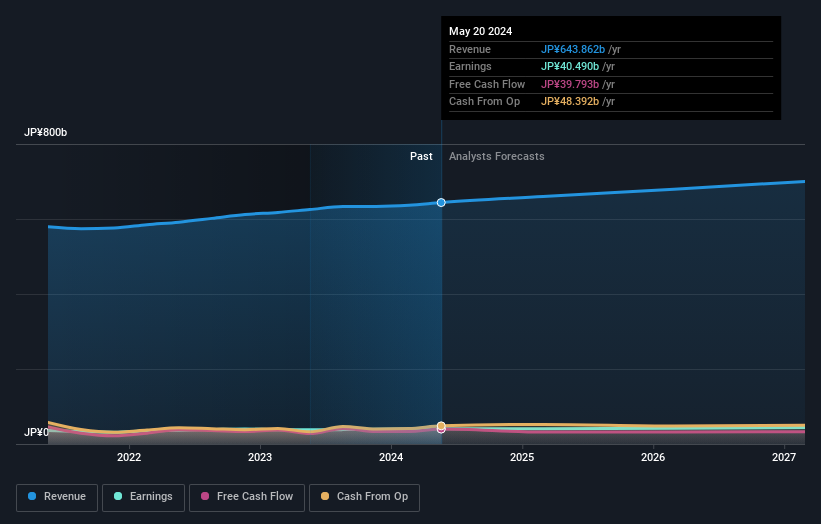- Japan
- /
- Specialty Stores
- /
- TSE:8227
SHIMAMURA Co., Ltd.'s (TSE:8227) largest shareholders are individual investors with 38% ownership, private companies own 31%

Key Insights
- SHIMAMURA's significant individual investors ownership suggests that the key decisions are influenced by shareholders from the larger public
- A total of 11 investors have a majority stake in the company with 50% ownership
- 28% of SHIMAMURA is held by Institutions
A look at the shareholders of SHIMAMURA Co., Ltd. (TSE:8227) can tell us which group is most powerful. And the group that holds the biggest piece of the pie are individual investors with 38% ownership. That is, the group stands to benefit the most if the stock rises (or lose the most if there is a downturn).
Meanwhile, private companies make up 31% of the company’s shareholders.
Let's take a closer look to see what the different types of shareholders can tell us about SHIMAMURA.
Check out our latest analysis for SHIMAMURA

What Does The Institutional Ownership Tell Us About SHIMAMURA?
Institutions typically measure themselves against a benchmark when reporting to their own investors, so they often become more enthusiastic about a stock once it's included in a major index. We would expect most companies to have some institutions on the register, especially if they are growing.
We can see that SHIMAMURA does have institutional investors; and they hold a good portion of the company's stock. This implies the analysts working for those institutions have looked at the stock and they like it. But just like anyone else, they could be wrong. If multiple institutions change their view on a stock at the same time, you could see the share price drop fast. It's therefore worth looking at SHIMAMURA's earnings history below. Of course, the future is what really matters.

We note that hedge funds don't have a meaningful investment in SHIMAMURA. Our data shows that Shimamura Planning Corporation is the largest shareholder with 16% of shares outstanding. Meanwhile, the second and third largest shareholders, hold 9.2% and 6.4%, of the shares outstanding, respectively.
Looking at the shareholder registry, we can see that 50% of the ownership is controlled by the top 11 shareholders, meaning that no single shareholder has a majority interest in the ownership.
While it makes sense to study institutional ownership data for a company, it also makes sense to study analyst sentiments to know which way the wind is blowing. There are a reasonable number of analysts covering the stock, so it might be useful to find out their aggregate view on the future.
Insider Ownership Of SHIMAMURA
The definition of company insiders can be subjective and does vary between jurisdictions. Our data reflects individual insiders, capturing board members at the very least. The company management answer to the board and the latter should represent the interests of shareholders. Notably, sometimes top-level managers are on the board themselves.
Insider ownership is positive when it signals leadership are thinking like the true owners of the company. However, high insider ownership can also give immense power to a small group within the company. This can be negative in some circumstances.
We can see that insiders own shares in SHIMAMURA Co., Ltd.. It is a pretty big company, so it is generally a positive to see some potentially meaningful alignment. In this case, they own around JP¥19b worth of shares (at current prices). It is good to see this level of investment by insiders. You can check here to see if those insiders have been buying recently.
General Public Ownership
The general public-- including retail investors -- own 38% stake in the company, and hence can't easily be ignored. This size of ownership, while considerable, may not be enough to change company policy if the decision is not in sync with other large shareholders.
Private Company Ownership
It seems that Private Companies own 31%, of the SHIMAMURA stock. It might be worth looking deeper into this. If related parties, such as insiders, have an interest in one of these private companies, that should be disclosed in the annual report. Private companies may also have a strategic interest in the company.
Next Steps:
While it is well worth considering the different groups that own a company, there are other factors that are even more important. For example, we've discovered 1 warning sign for SHIMAMURA that you should be aware of before investing here.
Ultimately the future is most important. You can access this free report on analyst forecasts for the company.
NB: Figures in this article are calculated using data from the last twelve months, which refer to the 12-month period ending on the last date of the month the financial statement is dated. This may not be consistent with full year annual report figures.
New: Manage All Your Stock Portfolios in One Place
We've created the ultimate portfolio companion for stock investors, and it's free.
• Connect an unlimited number of Portfolios and see your total in one currency
• Be alerted to new Warning Signs or Risks via email or mobile
• Track the Fair Value of your stocks
Have feedback on this article? Concerned about the content? Get in touch with us directly. Alternatively, email editorial-team (at) simplywallst.com.
This article by Simply Wall St is general in nature. We provide commentary based on historical data and analyst forecasts only using an unbiased methodology and our articles are not intended to be financial advice. It does not constitute a recommendation to buy or sell any stock, and does not take account of your objectives, or your financial situation. We aim to bring you long-term focused analysis driven by fundamental data. Note that our analysis may not factor in the latest price-sensitive company announcements or qualitative material. Simply Wall St has no position in any stocks mentioned.
About TSE:8227
SHIMAMURA
Engages in the sale of clothing and fashion related products in Japan and Taiwan.
Flawless balance sheet average dividend payer.


